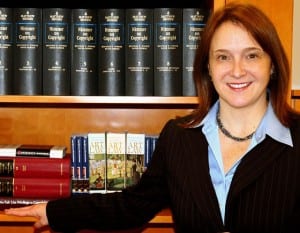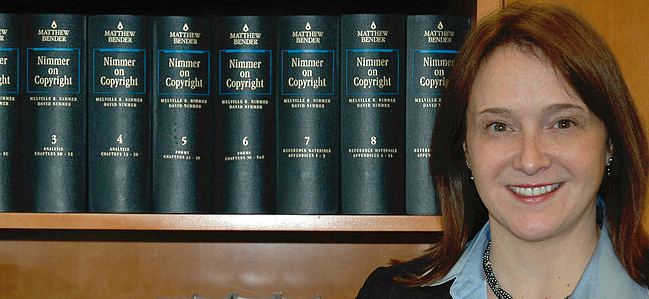Register of Copyrights Calls for a Complete Rewrite of Copyright Law
 Today, Maria Pallante, the Register of Copyrights at the U.S. Copyright Office, will be testifying before the Subcommittee on Courts, Intellectual Property and the Internet Committee on the Judicary in Congress.
Today, Maria Pallante, the Register of Copyrights at the U.S. Copyright Office, will be testifying before the Subcommittee on Courts, Intellectual Property and the Internet Committee on the Judicary in Congress.
Her testimony, which you can read in full here, calls for nothing short of a complete rewrite of U.S. copyright law. According to Pallante, “The law is showing the strain of its age,” and requires the attention of Congress.
As Pallante notes, even though the last major copyright revision was the Digital Millennium Copyright Act in in 1998, the bulk of the law comes from the Copyright Act of 1976, the most recent redrafting of the law. However, that law took over two decades to complete and was seen as many as obsolete by the time it was passed.
Though it’s unlikely that Congress is going to jump at the opportunity to take up the long, difficult and controversial task of rewriting copyright law completely, Pallante’s nudging could still have an impact by planting the idea in the minds of legislators that it’s important to undertake the task soon.
So, even if it isn’t immediate or in the next few years, Pallante’s testimony and pleas could be seen as a touchstone moving forward and, though Pallante has no means to force Congress to pass legislation one way or another, her position and expertise are both respected so it’s likely, should such legislation be proposed, that her views will taken into account.
So what is Pallante proposing and what changes would her proposals bring to copyright in the U.S.? I’ve decided to dig deeper into her testimony and find out.
What Pallante Proposed
To be clear, Pallante’s speech, at least according to her prepared remarks, does not make very many specific proposals. In most places, it stops short of telling Congress what it should or should not do and simply focuses on the questions she feels need to be addressed.
Some of the key issues discussed include:
- What Copyright Holders Should Control: Pallante says that the shift to digital (in particular mobile) means fewer people own the content they enjoy, raising questions on what rights a copyright holder should have saying that the rights should not be absolute but should be “meaningful”.
- Performance Rights for Sound Recordings: Pallante singled this area out as one where Congress has “more than a decade of debate” on the subject and can improve the way musical works are licensed.
- Copyright Term: Pallante proposed reducing the copyright term from the life of the author plus seventy years to the life of the author plus fifty years, with another twenty added if the heirs choose to file for an extension.
- Opt Out: Pallante wants to make it so that certain institutions, such as libraries and archives to be able to use copyrighted works unless the rightsholder opts out. This is opposed to the current system, that requires such organizations to first obtain permission.
- Miscellaneous Issues: Finally, Pallante, almost in passing, touched on a variety of issues that would have to be weighed including, among others, orphan works, accommodating those with disabilities, educational institutions, guidance on statutory damages, the efficacy of the DMCA and copyright small claims.
Pallante ends her speech saying that copyright has to keep the public interest at the forefront but noted that the interests artists and content creators are not separate from the interest of the public and are, according to her, “At the very center of the equation.”
However, Pallante’s talk isn’t being provided in a vacuum. Via footnote, she references another speech that she gave two weeks ago to Columbia university, the full text of which can be found here (PDF).
There, she repeats many of the same points but also highlights several “major issues” that the next copyright law would have to tackle, including, exclusive rights, incidental copies, enforcement, The Digital Millennium Copyright Act, digital first sale, exceptions, limitations, licensing and deposits for the Library of Congress.
However, here again she avoids making many specific recommendations and simply highlights issues that she feels Congress will have to look at in order to write the next copyright law.
My Thoughts and Responses
Since Pallante’s talks don’t offer much in the way of specific proposals, it’s almost impossible to offer any meaningful commentary on them. The only proposal she does make, reducing the copyright term to life plus fifty years with an option to renew for another twenty, is hardly earth shattering.
In fact, many countries already use the term of life plus fifty years without the opportunity to renew. It would hardly be a radical shift in the law and wouldn’t result in a deluge of new material reaching the public domain.
Instead, much of the discussion about Pallate’s speech deals more with her tone and reading between the lines. Last year, Pallante was a staunch supporter of the controversial Stop Online Piracy Act (SOPA), saying that the legislation was essential for copyright protection. Today though, her tone has changed and she’s calling for a new law that is “More forward thinking and flexible than before.”
Copyright holders and organizations that had seen Pallante as a staunch ally during the SOPA controversy are stung by this seeming about face. However, it’s hard to put Pallante’s statements as anything other than pro-artist. Though there’s more talk about balance, it’s clear that Pallante still puts content creators at the “heart” of the issue.
Still, when you honestly look at Pallante’s proposals, it’s clear that they aren’t that radical. In fact, they aren’t really proposals at all.
At the end of the day, all Pallante is doing is telling Congress that she feels it’s time for a completely new copyright law and that these are the issues such a law would have address. She then leaves the discussion before making any firm plans.
Pallante and the U.S. Copyright Office, instead provide their proposals and suggestions through a series of studies that they put together at the request of Congress. According to Pallante, those studies have included first sale issues, orphan works, library exemptions, statutory licensing reform and the ongoing studies about small copyright claims and resale royalties.
However, even those have had precious little impact on legislation. Though the U.S. Copyright Office proposed legislation on orphan works in 2008, Congress has been unable to pass anything on the subject and it is unlikely that they will any time soon.
In short, all Pallante is doing is planting a seed and it’s a see that, like it or not, is unlikely to grow.
Bottom Line
The truth is this: Congress is still stung by the backlash of the SOPA and PIPA debates. Congress has been very shy about taking on copyright laws of any type since then and the change in Pallante’s done indicates that she may have been impacted by the backlash as well.
This means though that Congress will not be eager to take on a mammoth task like overhauling copyright at this time. As Pallante’s testimony points out, it’s a huge task with many divisive issues and most see the current system as working “well enough” for now.
Congress is simply too divided, too gun shy and too occupied with other issues to start work on this and, even if it did, there would like be many years, possibly decades, of negotiation, study and debate before anything was passed.
If Pallante’s talk does bear fruit and give us a new copyright act, it may happen well after she leaves office.
Any such legislation would, obviously, be out of date before it was passed to and that, in turn, may be the biggest problem of all. More than the current law being out of date, the legislation process in this area is simply too slow to keep up with the changes in technology.
If the Copyright Act of 1976 was already behind the times when it was passed, what would a similar act passed in 2030 look like if it were rooted in today’s technology?
That, may be the biggest challenge facing copyright today.
Want to Reuse or Republish this Content?
If you want to feature this article in your site, classroom or elsewhere, just let us know! We usually grant permission within 24 hours.
